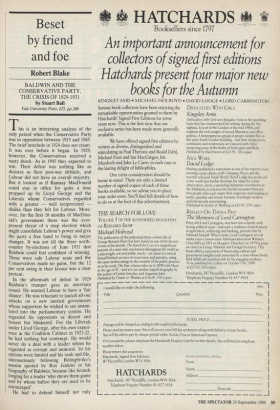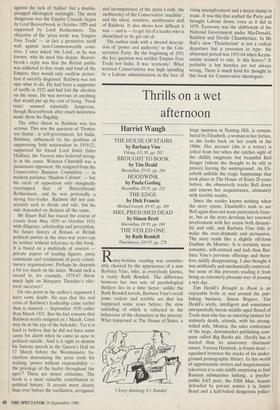Beset by friend and foe
Robert Blake
BALDWIN AND THE CONSERVATIVE PARTY, THE CRISIS OF 1929-1931 by Stuart Ball
Yale University Press, £25, pp.266
This is an interesting analysis of the only period when the Conservative Party was in opposition between 1915 and 1945. The brief interlude in 1924 does not count. It was over before it began. In 1929, however, the Conservatives received a nasty shock. As in 1945 they expected to win. Their defeat was nothing like as decisive as their post-war debacle, and Labour did not have an overall majority. But it looked as if Ramsay MacDonald could stay in office for quite a time propped up by Lloyd George and the Liberals whom Conservatives regarded with a greater — well reciprocated dislike than they felt for Labour. More- over, for the first 18 months of MacDon- ald's government there was the ever- present threat of a snap election which might consolidate Labour's power and give the party a free hand to bring in major changes. It was not till the three north- country by-elections of June 1931 that Baldwin could feel confident of winning. These were safe Labour seats and the Conservatives made no gains, but the 12 per cent swing in their favour was a clear portent.
In the aftermath of defeat in 1929 Baldwin's trumpet gave an uncertain sound. He wanted Labour to have a 'fair chance'. He was reluctant to launch all-out attacks on a new untried government whose supporters he wished to see assimi- lated into the parliamentary system. He regarded his opponents as decent and honest but blinkered. For the Liberals under Lloyd George, after his own experi- ence in the Coalition Cabinet in 1921-22, he had nothing but contempt. He would never do a deal with a leader whom he regarded as corrupt and immoral. So his options were limited and his rank and file, unconsciously following Bolingbroke's maxim quoted by Roy Jenkins in his biography of Baldwin, became like hounds longing for a leader 'who shows them game and by whose halloo they are used to be encouraged'. He had to defend himself not only against the lack of 'halloo' but a double- pronged ideological onslaught. The most dangerous was the Empire Crusade begun by Lord Beaverbrook in October 1929 and supported by Lord Rothermere. The objective of the 'press lords' was 'Empire Free Trade' — in fact a protective tariff wall against non-Commonwealth coun- tries. I once asked 'the Lord', as he was known, why he used this slogan. Beaver- brook's reply was that the British public was addicted to free trade and fond of the Empire; they would only swallow protec- tion if suitably disguised. Baldwin was not sure what to do. He had been a supporter of tariffs in 1923 and had lost the election on the issue. He was nervous of anything that would put up the cost of living. 'Food taxes' seemed especially dangerous, though Beaverbrook after much hesitation made them his flagship.
The other threat to Baldwin was less serious. This was the question of 'Domin- ion Status', ie self-government, for India. Baldwin, influenced by the problem of suppressing Irish nationalism in 1919-22, supported his friend Lord Irwin (later Halifax), the Viceroy who believed strong- ly in the cause. Winston Churchill was a passionate opponent. He resigned from the Conservative Business Committee — in modern parlance 'Shadow Cabinet' — but his circle of opposition only marginally overlapped that of Beaverbrook/ Rothermere, and he was personally a strong free-trader. Baldwin did not con- sciously seek to divide and rule, but his rule depended on division all the same.
Mr Stuart Ball has traced the course of events from May 1929 to October 1931 with diligence, scholarship and perception. No future history of Britain or British political parties in the inter-war years can be written without reference to this book. It is based on a multitude of sources private papers of leading figures, press comments and resolutions of party consti- tuency organisations. Perhaps he depends a bit too much on the latter. Would such a record in, for example, 1979-87 throw much light on Margaret Thatcher's elec- toral successes?
On one point in the author's argument I have some doubt. He says that the real crisis of Baldwin's leadership came earlier than is claimed — September 1930 rather than March 1931. But the fact remains that Baldwin nearly resigned on 1 March. Crisis may be in the eye of the beholder. Yet it is hard to believe that he did not have some cause for alarm when he came so near to political suicide. And is it right to dismiss his famous speech in the Queen's Hall on 17 March before the Westminister by- election denouncing the press lords for seeking 'power without responsibility the privilege of the harlot throughout the ages'? These are minor criticisms. The book is a most valuable contribution to political history. It reveals more clearly than ever before the vacillation, arrogance and incompetence of the press Lords, the inefficiency of the Conservative 'machine', and the silent, sensitive, unobtrusive skill of Baldwin. It also shows how difficult it was — and is — to get rid of a leader who is disinclined to be got rid of.
The author ends with a shrewd descrip- tion of 'power and authority' in the Con- servative Party. By the beginning of 1931 the key question was neither Empire Free Trade nor India. It was 'economy'. What worried Conservatives was high spending by a Labour administration in the face of rising unemployment and a major slump in trade. It was this that unified the Party and brought Labour down, even as it did in 1979. Economy was the shibboleth of the National Government under MacDonald, Baldwin and Neville Chamberlain: In Mr Ball's view `Thatcherism' is not a radical departure but a reversion to type; the abnormal period was 1951-64 when Keyns- ianism seemed to rule. Is this heresy? It probably is but heretics are not always wrong. There is much food for thought in this book for Conservative ideologues.































































 Previous page
Previous page